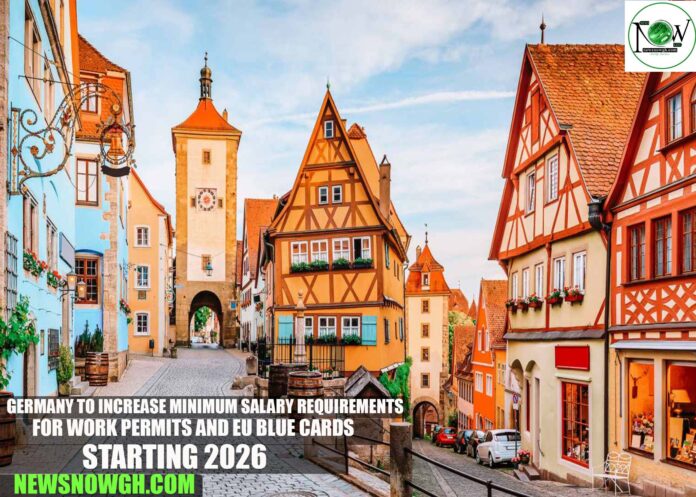Germany to Increase Minimum Salary Requirements for Work Permits and EU Blue Cards Starting 2026
Germany is set to increase its minimum salary requirements for foreign professionals applying for the EU Blue Card and Skilled Worker Permit programs. Starting January 2026, these new salary thresholds will reflect rising wage standards and aim to attract international talent in crucial sectors like IT, healthcare, and engineering.
New Salary Requirements for EU Blue Card Holders
Germany’s EU Blue Card remains a popular option for highly skilled non-EU professionals. In 2026, the country will adjust the entry-level salary requirements across various categories:
- Non-Shortage Occupations: Workers in fields not on Germany’s shortage list must earn at least €50,700 annually, up from €48,300. This change aligns salaries with inflation and market trends.
- Shortage Occupations: For high-demand roles in IT, healthcare, and engineering, the minimum salary will increase to €45,934.20, from €43,759.80. This adjustment aims to attract more qualified professionals.
- Young Professionals: Recent graduates applying within three years of their qualifications will also need a minimum salary of €45,934.20, up from €43,759.80. This change supports young talent in launching their careers in Germany.
- Experienced Specialists: Professionals with extensive experience will require a salary of at least €45,630, compared to the previous €43,470. This increase ensures that skilled experts receive fair compensation for their expertise.
Increased Salary for Skilled Worker Permit Applicants
For individuals applying under the Skilled Worker Permit or Local Hire Permit, a new salary rule will apply to those aged 45 and older. Starting in 2026, they must earn a minimum of €55,770 annually, up from €53,130. Applicants who do not meet this threshold must provide proof of adequate retirement savings to qualify.
National Minimum Wage Update
Germany’s national minimum wage will rise to €12.82 per hour from €12.41, effective January 1, 2025. This change does not affect work visa holders, who are already required to earn a market-rate salary based on their roles and qualifications.
Salary Rules for Other Work Permits
Foreign employees holding other types of residence permits, such as the EU Intra-Company Transfer (ICT) Card or Local Hire Work & Residence Permit, must receive salaries comparable to German workers in similar positions. Employers must ensure that salaries are paid in euros, and EU Blue Card holders must be on the local payroll.
Implications for Foreign Workers
For professionals aiming to work in Germany, these salary increases mean slightly higher income requirements but also a commitment to fair wages. This move reflects Germany’s broader strategy to attract qualified talent while ensuring that foreign workers are compensated on par with local employees.
In summary, if you plan to apply for a German work visa or EU Blue Card in 2026, be prepared for a modest but significant increase in salary thresholds. Ensure your job offer meets the new standards to facilitate your application process.
Follow NewsNowGh to stay updated on the latest information regarding work permits, visas, and visa-sponsored employment.


